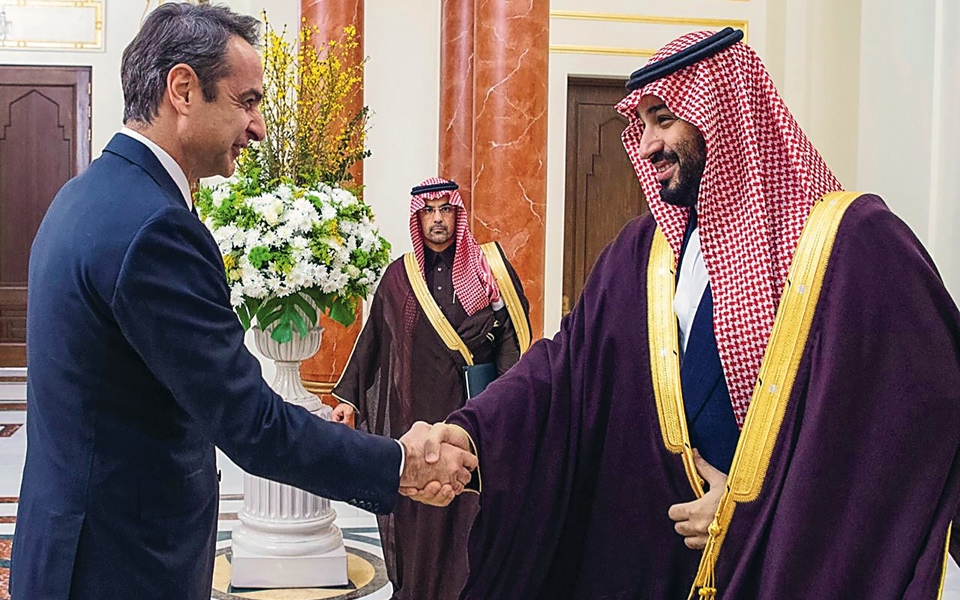The Gulf economies

Greece’s recent overtures toward two of the largest economies of the Gulf – highlighted by the recent visits of Greek Prime Minister Kyriakos Mitsotakis to Riyadh and Abu Dhabi – are strategic and historically well placed. Despite the drop in oil prices, both countries are very asset rich. Saudi Arabia is the largest economy in the Middle East, 18th largest in the world and the only Arab country to be a founding member of the Group of 20 of the world’s largest economies. This year, Saudi Arabia takes on the chairmanship of the G20. The Kingdom’s central bank foreign assets are two and half times Greece’s GDP. The UAE’s sovereign fund is roughly six to seven times larger than the Greek economy. The above facts are mentioned not to belittle the Greek economy or to exaggerate the importance of the two Gulf economies. Both Greece and the Gulf economies have their own challenges. Greece is in need of investments to generate growth and employment and the Gulf is undertaking bold reforms in order to construct a post-oil future. It is this confluence of events between the two sides that could bring Greece and the Gulf much closer.
Since 2015, Saudi Arabia has embarked on an ambitious yet very much-needed reform path to reconstruct the state, economy and society. Crown Prince Mohammed bin Salman is bringing veritable change. In just a few years, Saudi Arabia has opened up to tourists for the first time, dramatically eased restrictions on woman, including allowing women to drive and travel freely outside, allowed cinemas, and brought world-class concerts and sporting spectacles. Just like in the UAE, the new Saudi leadership has an acute distaste for political Islam. Many often forget that Saudi Arabia is a country the size of Western Europe with a population of 34 million.
The UAE, which has a much smaller population of less than 10 million, has been testing the waters of diversification for longer and made strides in services, logistics, trade, industry and tourism. More recently, the UAE has approved a three-year $15 billion stimulus package aimed at facilitating long-term economic benefits. Abu Dhabi, which accounts for about two-thirds of the UAE’s economy, is effectively led by another reformer and visionary, the crown prince of the same Emirate, Mohammed bin Zayed.
By 2019, the combined assets of the Gulf sovereign wealth funds (SWFs) were estimated at more than $3 trillion, which represented a remarkable 40 percent of the global SWF assets. In addition, their strategic position has in many cases evolved beyond purely financial objectives. Many of them have invested in companies that have served as a source of not just profits but also knowledge and new technology.
Kuwait continues to be an economic powerhouse with a significant regional and international presence. Although Qatar still maintains the top position in the world in per capita GDP terms, Kuwait is the eighth largest after the UAE. Due to its economic and small geographic size, Kuwait has invested for much longer outside its borders – with the creation of the Kuwait Investment Board in 1953 – than most other Gulf economies. Even though much smaller in economic size, Bahrain and Oman command the respect of their fellow Gulf neighbors for their ability to withstand the vicissitudes of fiscal uncertainty. Just like Saudi Arabia’s Vision 2030, Oman and Bahrain have embarked on a path of economic transformation, albeit more gradual, over the last few years.
Particularly impressive progress has materialized in the space of capital markets. After the successful IPO of Saudi Aramco, Saudi Arabia now boasts a globally significant stock exchange, which is diversified with some 200 listed companies, open to foreign investors. Since 2018-19, the Saudi market has also been included in key emerging market indices, which is also true for the UAE, Qatar, and Kuwait. These developments are attracting substantial amounts of global institutional capital but also increasing analyst attention to regional corporates.
Gulf economies offer a lifeline to the rest of the Middle East not only for the millions of Arab workers remitting billions of dollars each year, from the Maghreb to the Levant, but also in emergency assistance. Egypt’s economy avoided a catastrophic collapse in 2012 after receiving $12 billion in emergency liquidity assistance from Saudi Arabia, the UAE and Kuwait. The Egyptian government may need to call on the generosity of its Gulf Arab neighbors in the future, whether through fresh deposits or through rolling over existing ones, particularly during the repayment period on the IMF loans between 2021 and 2027.
The Gulf has long enjoyed closer ties with the Indian subcontinent, which have coincided with the emergence of India as an increasingly global power. The Gulf also features in the One Road, One Belt plans of the Chinese authorities and Chinese companies have established a growing presence in the Gulf.
Today, Greece is wise to seriously embrace the Gulf for the long term as it has much to offer: a stable, trustworthy, confident and very investor-friendly government. The three reform-minded leaders of Greece, Saudi Arabia and the UAE have to use their time astutely to construct deeper strategic relations with investments as one of its main pillars.
John Sfakianakis is the chief economist and head of research of the Gulf Research Center, an associate fellow at Chatham House and a scholar at Pembroke College, University of Cambridge.





